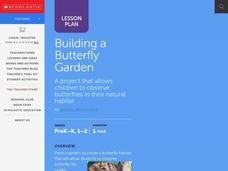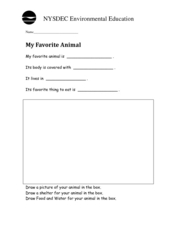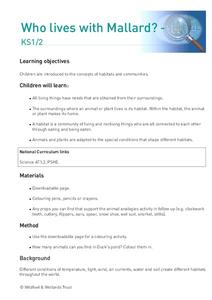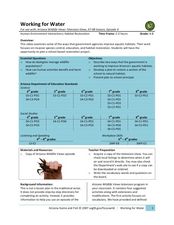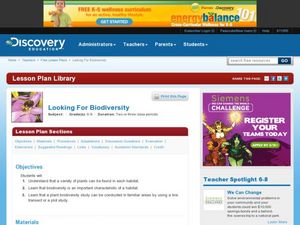Curated OER
Special Place
Pupils observe and describe a "special place" chosen along a nature trail. For this habitat observational skills and writing lesson, students take a walk on a nature trail and choose a spot to sit and meditate. Pupils complete a...
Curated OER
Habitat Cards
Students discuss the relationship between a habitat and the environment. In groups, they use the internet to research the relationship between the animals and the habitat on their card. They present their information to the class to...
Curated OER
Building a Butterfly Garden
Students plant a garden which will become the habitat for butterflies as they go through their life cycle. In this life cycle lesson, students grow plants that attract butterflies and feed caterpillars in order to observe the entire...
Curated OER
My Habitat Address
Sixth graders draw a habitat and write about what they would need to survive in the habitat. They define the input of items such as materials, energy, and information, and what goes out of the habitat. They play a "Habitat Address" game,...
Curated OER
We All Live Together
First graders examine the lifestyle of classroom and family pets in their natural habitat. They determine the needs of plants and animals, and how those needs are met. They listen to read alouds, sing songs, and draw using computer based...
Curated OER
Costa Rican Food Chain
Discuss the animals and plants in the rainforest food chain using this activity. Learners talk about and do research on the top predators from the Costa Rican region and create a model of one of them in class. They also make a visual...
Curated OER
Dependence and Interdependence
Third graders explore the dependence and interdependence that plants and animals in every environment have on one another. They examine how plants and animals depend on each other for survival. Students complete a variety of experiments...
Curated OER
Investigating Animals in Water
Students observe small animal activity. They identify local water animals and describe the habitats where water animals can be found. Students collect samples to observe in the classroom.
Curated OER
The Invisible Zoo
Students explore how infrared images give biologists or zoologists detailed information on how warm-blooded and cold-blooded animals thermoregulate. They are introduced to infrared imaging technology and the information that such images...
Curated OER
Awesome Animals
Students collect data from classmates about their favorite animal. They use the ClarisWorks graphing program to enter data, graph results, and interpret data.
Curated OER
NYSDEC Environmental Education
In this Earth environment worksheet, 2nd graders answer 4 questions about their favorite animal. Students must also draw a picture of that animal inside a shelter in the box provided.
Curated OER
Hide and Seek
Students explore animal characteristics by creating a poster presentation in class. In this animal habitat lesson, students visit the local zoo and identify which habitats certain animals are most comfortable in. Students answer study...
Curated OER
Who lives with Mallard?
Students explore how all living things have needs that are obtained from their surroundings. They identify the surroundings where an animal or plant lives is its habitat. Students identify that a habitat is a community of living and...
University of South Carolina
Home Sweet Home
Fifth graders will research a biome (land or aquatic) and create a project (diorama, model or another idea of the student's choosing) which includes the geographic features of that biome as well as plants and animals found there and...
Curated OER
The Excretory System
In this excretory system worksheet, students read a brief excerpt about water balance and the excretory system. Then they identify what compound birds, insects and reptiles living in dry habitats excrete. Students also describe how...
Curated OER
Working for Water
Students examine the ways that government works to help improve aquatic habitats. In this water habitats lesson students view a video and plan a school restoration project.
Curated OER
Oh No! Oil Spills
Students discover the threats of an oil spill. In this ecological awareness instructional activity, students examine the effects of oil spills on animals and our oceans. Students get simulated oil on themselves and discover ways to...
Curated OER
Chewin' in the Chesapeake
High schoolers examine a web page on food webs and select a habitat to research. In this research lesson students identify the organisms found in the food web and present their findings to the class.
Curated OER
Looking for Biodiversity
Pupils explore habitats and see that there are a variety of plants that can be found and that biodiversity is an important characteristic. For this biodiversity lesson students complete an activity that explains how to perform a plant...
Curated OER
The Invisible Zoo
Students differentiate cold and warm-blooded animals using infrared images. In this physics lesson, students compare the images formed by infrared and visible light. They explain how scientists use infrared technology to study animals.
Curated OER
A Natural Habitat: What, How and Why
Students understand what a habitat is. They determine why a habitat is important to our environment no matter where it is located. Students observe and recognize natural habitats in their surroundings.
Curated OER
Animal Games
Students explore a variety of games on the Internet that will teach them about animals; they focus on the Florida panther. Students choose the activity that is of interest to them, and then rotate between the games online and the games...
Curated OER
The Salamander Room
Students examine how each animal's habitat provides what that animal needs for survival. They discuss what an animal needs to survive-food, shelter, water, and space.
Curated OER
Summer Camp in the Classroom
Students explore wildlife plants and summer activities. In this natural science lesson, students identify plants and animals and create a scrapbook of their findings.




